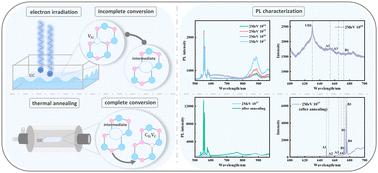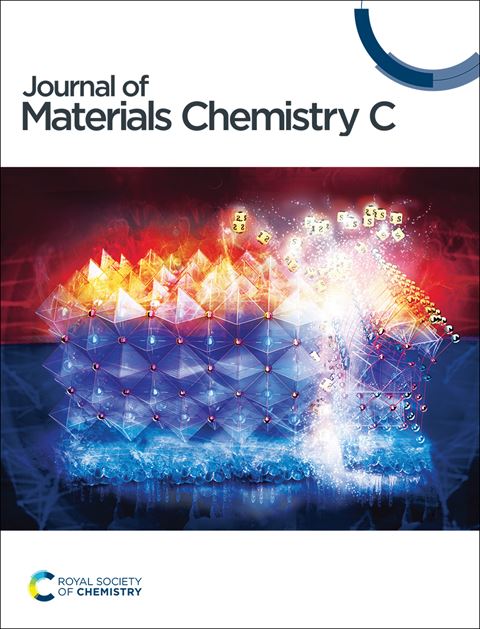通过电子辐照和随后的退火制备和转化 4H-SiC 中的色心
IF 5.7
2区 材料科学
Q2 MATERIALS SCIENCE, MULTIDISCIPLINARY
引用次数: 0
摘要
实现具有确定类型和可控浓度的色心制备对于量子传感和量子通信等量子应用至关重要。在 4H 碳化硅(4H-SiC)中可以引入许多缺陷,它们能够在特定情况下发生转变。探索缺陷的转化条件对于优化色心制备参数至关重要。本文研究了通过电子辐照和随后的退火处理制备和转化 4H-SiC 中的色心。首先,利用电子辐照(2 MeV 和 10 MeV,1014-1017 e cm-2)制备硅空位。随后,在 2 MeV 1016 e cm-2 的样品中发现了硅空位转化为碳反位错空位对(CAV)的现象。然后,比较了辐照和退火引起的缺陷转化,发现前者不如后者彻底,伴随着两种未知的中间状态,但它们最终可以通过退火消除。最后,对硅空位和 CAV 的制备条件进行了优化,2 MeV 的辐照能有效制备 CAV,而 10 MeV 的辐照能产生更多的硅空位。我们的发现是制备颜色中心的关键一步,为颜色中心在量子领域的应用奠定了基础。本文章由计算机程序翻译,如有差异,请以英文原文为准。

Preparation and transformation of color centers in 4H-SiC by electron irradiation and subsequent annealing
Achieving color center preparation with deterministic type and controllable concentration is crucial for quantum applications, such as quantum sensing and quantum communication. Numerous defects can be introduced in 4H-silicon carbide (4H-SiC), and they are capable of undergoing transformations under specific circumstances. Exploring defects’ transformation conditions is essential for optimizing the color center preparation parameters. Herein, the preparation and transformation of color centers in 4H-SiC by electron irradiation and subsequent annealing treatment are investigated. Firstly, silicon vacancy was prepared using electron irradiation (2 MeV and 10 MeV, 1014–1017 e cm−2). Subsequently, a phenomenon of silicon vacancy conversion to carbon antisite vacancy pairs (CAV) was discovered in the 2 MeV 1016 e cm−2 sample. Then, a comparison was made between the defect transformation caused by irradiation and annealing, and it was found that the former was not as thorough as the latter, accompanied by two unknown intermediate states, but they could ultimately be eliminated by annealing. Finally, the preparation conditions for silicon vacancy and CAV were optimized, with 2 MeV irradiation being effective for preparing CAV, whereas 10 MeV irradiation yields a higher quantity of silicon vacancy. Our findings serve as a crucial step in the preparation of color centers and lay the foundation for the application of color centers in quantum field.
求助全文
通过发布文献求助,成功后即可免费获取论文全文。
去求助
来源期刊

Journal of Materials Chemistry C
MATERIALS SCIENCE, MULTIDISCIPLINARY-PHYSICS, APPLIED
CiteScore
10.80
自引率
6.20%
发文量
1468
期刊介绍:
The Journal of Materials Chemistry is divided into three distinct sections, A, B, and C, each catering to specific applications of the materials under study:
Journal of Materials Chemistry A focuses primarily on materials intended for applications in energy and sustainability.
Journal of Materials Chemistry B specializes in materials designed for applications in biology and medicine.
Journal of Materials Chemistry C is dedicated to materials suitable for applications in optical, magnetic, and electronic devices.
Example topic areas within the scope of Journal of Materials Chemistry C are listed below. This list is neither exhaustive nor exclusive.
Bioelectronics
Conductors
Detectors
Dielectrics
Displays
Ferroelectrics
Lasers
LEDs
Lighting
Liquid crystals
Memory
Metamaterials
Multiferroics
Photonics
Photovoltaics
Semiconductors
Sensors
Single molecule conductors
Spintronics
Superconductors
Thermoelectrics
Topological insulators
Transistors
 求助内容:
求助内容: 应助结果提醒方式:
应助结果提醒方式:


